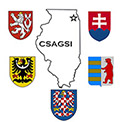Pilsen Brewing Company and Pilsen Park
The Pilsen Brewery and Pilsen Park in Chicago History – By Paul Nemecek
Originally published in the Spring 1998 issue of the CSAGSI Journal Koreny
“On September 3, 1903 seven Bohemian tavern owners combined to establish a cooperative brewery. The Pilsen Brewing Company, as an answer to what they regarded as the monopolistic policies of the Schlitz Brewing Company. John A. Cervenka, born in Bohemia, and a Pilsen innkeeper was elected president of the new enterprise. Other officers were Jaroslav Zastera – vice president, Roman Sedlacek – secretary, and Frantisek Kalus – treasurer. Others in management were: Josef Hanzlik, Vaclav Hruby, Jan Kastner, Josef Kovar, Stepan Popowich, and Rudolph Rubringer.
The company’s modern plant, designed by Adolf Lonek was located on the corner of 26th Street and Albany Avenue (3100 west) occupying six acres of land. The brewery employed mostly Slavic workers. In August 1907 the stockholders of the Pilsen Brewing Company decided to open a beer garden on a lot adjacent to their plant. It was an empty lot used previously by various Sokol groups for gymnastic demonstrations. The announceme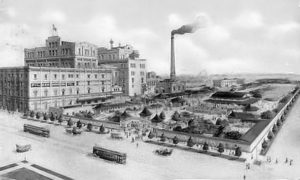 nt in 1907 called for the creation of a park, dining room for 600 to 700 people, a saloon, a dance pavilion, and a large stage. This new facility, or simply Pilsen Park opened the following spring and soon became a center for Czech cultural and institutional life and a place for community celebration. The park attracted Czechs from all parts of the community, providing a neutral ground where Czechs could be Czechs, freely peaking on matters political, religious or even revolutionary. This was something generally not possible during that time in American-controlled public places.
nt in 1907 called for the creation of a park, dining room for 600 to 700 people, a saloon, a dance pavilion, and a large stage. This new facility, or simply Pilsen Park opened the following spring and soon became a center for Czech cultural and institutional life and a place for community celebration. The park attracted Czechs from all parts of the community, providing a neutral ground where Czechs could be Czechs, freely peaking on matters political, religious or even revolutionary. This was something generally not possible during that time in American-controlled public places.
Weekend after weekend saw Pilsen Park filled with Chicago’s Czechs attending outings, picnics, labor meetings, Sokol exhibitions, concerts, or political rallies. A variety of ethnic festivals, i.e. Czech, Polish, or Italian, were also held. Some of the groups typically using the facilities were the Fuegner-Tyrs Sokol, the Bohemian Catholic Organization, the Bohemian Old Settlers Association, the Bohemian National Alliance, United Moravian Societies, Alliance of Free Thinking Schools, Praha Odd Fellow Lodge, and the Czechoslovak Garden Club. The Women’s Trade Union League held meeting in Pilsen Park to organize strikers during the garment workers strike of 1910-1911.
The Bohemian Old Settlers Association held its sixteenth annual celebration in Pilsen Park in 1914. An announcement of this appeared in the Denni Hlasatel newspaper and reads as shown in the box below.
Translation provided by Robert O. Uher – “On Wednesday, July 22, 1914 in the beautiful garden of the Pilsen Brewery – beginning at 12 o’clock noon, the celebration continues with beautiful electric lighting until 10 P.M. The celebration speaker, Mr. J. Hospodsky will address the members in the absence of the President who is traveling to the old country. Mrs. M. Stuchlik, Vice President will open the ceremonies and welcome the guests. The Directors have arranged a fine entertainment. The well-known band of Mr. P. Rubringer will perform. There will be a contest among the oldest women and men settlers. Two gold medals will be awarded to the oldest men and women present at the celebration. There will also be a raffle wheel with valuable prizes. A confectionary stand has been provided. Also good beverage has been provided such as: a large barrel of genune Melnick wine (note: from an area around the town of Melnik in Northern Bohemia which has extensive vineyards) vintage 1905, from the Korbel brothers and the well-known lager “Olympia” from the Pilsen
Brewery (note: a well like type of beer such as “Pilsner” will be on tap.) Good coffee, Czech Kolacky, excellent smoked meat, remarkable ice cream from the Machek brothers and other tasty desserts will be available. Enrollment of new members will be from 2-6 P.M. Members of the club should not forget their membership badges. Entry to the grove will cost 15 cents per person. Return tickets will not be issued. Every year the old settlers meet at this celebration so they can again renew friendships.
To Your Health
Signed: Directors of the Club of Czech Old Settlers”
In 1914, as war clouds gathered over the Balkans, Czech Chicagoans continued to use Pilsen Park for community demonstrations and rallies. Pilsen Park provided a physical space which allowed Chicago Czechs to play a vital role in the eventual creation of an independent Czechoslovakia. Previous festivals became serious business. The Czechs began to organize their community agains the Austro-Hungarian Empire and to promote the idea of independence of their country in Europe. A shining hour for Chicago Czechs was during their leadership in conducting the war of liberation for the freedom of Czechoslovakia. An eight day bazaar was held in March 1917 and raised $40,000 for the Czech cause. The Bohemian National Alliance at a rally on Labor Day drew 30,000 participants. Finally on October 28, 1918, the independent state of Czechoslovakia was formed.
Subsequently, another meeting in the park led to the erection of a statue to the memory of Thomas G. Masaryk, the first president of Czechoslovakia. It was placed on the midway at the University of Chicago.
With the passing of time, Czech families began their slow migration to the suburbs and did not reurn on weekends to their magnificent gathering place. Eventually Pilsen Park was closed, and in 1967 a shopping mall was constructed on the site.”
Yusay Pilsen Beer, Chicago History Pilsen brewing Company - Originally submitted by Paul Nemecek - Published in the March 2011 edition of the CSAGSI membership journal Koreny.
"In 1903 a group of seven men of Bohemian birth or descent combined their resources and energies to form the Pilsen Brewing Company. Two reasons were behind its formation. At the time the brewing situation in Chicago was in a deplorable condition with rising prices dealers could barely make a profit from the sale of beer. The other was that the founders felt that the beer then being brewed did not satisfy the palates of the thousands of Chicago-land residents of Bohemian descent, and others as well, who preferred the brew that was typical of the products of the Bohemian breweries.
These founders were John Cervenka, a leader among Chicago-land's Bohemian population, who was its first president, Joseph Kovar, Joseph Souhrada, Stefan Popovich, Rudolf Rubringer, Thomas Lackovich, Roman Sedlacek and Frank J. Kalus, first treasurer, whose son Emil became a later president.
The goal of the firm was to brew the finest beer, in the best tradition of the world famed breweries of Pilsen in Bohemia. Because the Bohemian brewing center was known throughout the world as the home of fine products, and because the new brewery was to match its finest beer, the founders chose the name of "Pilsen" for the new brewery. The brewery, designed by Adolf Lonek, was located on the corner of 26th Street and Albany Avenue (3100 west). In 1907 the stockholders of the Pilsen Brewing Company decided to open a beer garden (Pilsen Park) on a lot adjacent to their plant with dining for 600 to 700 people, a saloon, a dance pavilion and a large stage.
Originally it was planned to call the brew "Pilsen Beer" but this implied it was an imported product. To clarify this, it was proposed to use the prefix "U.S.A", but there was objection to using the initials of the United States of America. Therefor two "Y"s were added to form the word YUSAY.
Thus came the name Yusay Pilsen, which signifies a beer of the type originated in Pilsen, Bohemia, that is brewed and bottled in the United States. Pilsen Brewing Company has grown with the years, but this was a controlled growth, never permitted t outdistance the volume of good beer that can be brewed. The founders established a policy that has never been deviated from by their successors, most of whom are sons or grandsons of founders or original stockholders.
While the later management included a large percentage of men of Bohemian descent, the process of assimilation which was characteristic of everything American resulted in the addition of other nationalities as well. In 1958, at the time of the 50th anniversary of the company, the board consisted of president Emil K. Kalus, vice president Adolph G. Hauer, treasurer George R. Kastner, secretary George J. Holas, brew master Joseph Sinka, and J.V. Moravec, James Hajek and Jerry Peckl"
Note: An article "The Pilsen Brewery and Pilsen Park in Chicago History" appeared in the Spring 1998 Koreny journal. This article is adapted from the Nov. 1951 issue of the Suburban Life newspaper.
Additional information found on the Pilsen Brewing Company
Denni Hlasatel – March 4, 1904 – Bohemian Industry. Laying of Corner Stone of New Bohemian Brewery.
“Those times have long since passed when Bohemians, immigrants in this land, were in all respects, which touched upon industry or business, dependent upon other nationalities. Today we occupy a leading position in so far as industry and business are concerned. Our business establishments are comparable to the largest in the city; many of our countrymen are owners of factories and businesses, in which is manufactured everything that we formerly had to buy from manufacturers and businesses of other nationalities.
One of the most important branches of industry, which is controlled by our country men, is without doubt the business of brewing. There are at present two breweries under the control of Bohemians and it will not be long before a third brewery will be added, of which only yesterday the corner stone was laid.
Surely, there is not one Bohemian, who would not welcome with joy the report about our great expansion in all branches of industry, and for that reason, it is certain that everyone wishes the best of luck for this new undertaking, in which Bohemian capital has been invested, and which promises to be a genuine Bohemian undertaking.
At the instigation of Mr. Roman Sedlacek, several Bohemian tavern keepers met on the 12 of June, 1903, to discuss the formation of a stock company to operate a brewery. The following were present at that meeting: Josef Hanzlik, a brewer; Josef Smejkal, a lawyer; Roman Sedlacek, Rud. Rubringer, Josef Kolar, Jan Cervanka, Tom Lackovic, Stef. Popovic, Josef Oborny, and Frant. Cerveny, tavern keepers.
Temporary officers were elected as follows: Messrs. Jan Cervenka, chairman and Roman Sedlacek, secretary.
On the 28th of August of that year, five and 4/10 acres of land, on 26th Street between Whipple and Troy Streets, were purchased. Then a meeting of all Chicago Bohemian tavern keepers was called and at this meeting, which took place on the 3rd of September, the plan for organizing a stock-company was explained to those 3present. Because thirty of those present pledged $1000 each, the proposed enterprise became an accomplished fact.
The company was incorporated on the 2nd of October 1930, with a capital of $100,000, under the name Pilsen Brewing Company of Chicago.
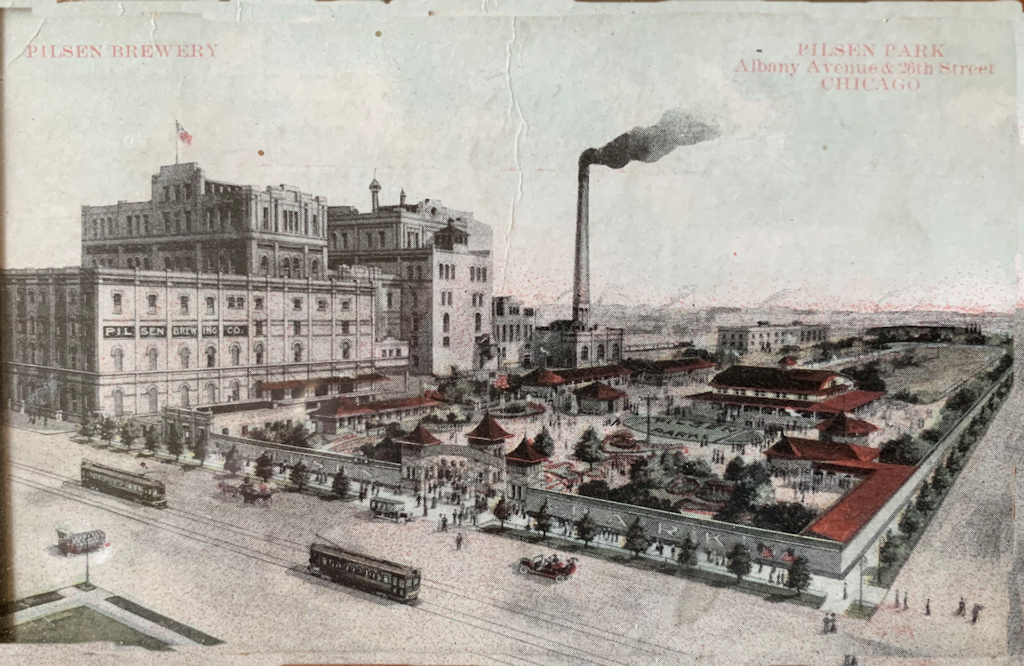
Image above courtesy of Paul Spinka. Paul worked at the brewery for a time, and his father and grandfather were Brewmasters at Pilsen Brewing.
A sketch of the building plans was prepared by the architects Messrs. Ant. Charvat and Ad. Lonka. Mr. Lonka was awarded the plans and Mr. Fr. Layer, contractor, was entrusted with construction Actual construction started November 16, 1903. The company is composed of seventy five shareholders. After the reading of this data, Mr. Cervenka addressed a few words to those present, urging them to remain steadfast on the course and always work in harmony and unison.
In the awarding of the various contracts preference was given wherever possible to Bohemians.”
Denni Hlasatel – December 8, 1907 – Pilsen Park in the Making
When, four years ago, the first stone was laid for the building of the Pilsen Brewery, we suggested in our report that it would greatly enhance the prospect of the enterprise if the remaining lots were used for the creation of a park along the lines of the beer gardens in the city of Prague which serve as social recreation centers. The well meant hint was appreciated by the Pilsen Brewery which has now begun with the preliminary work, progressing so rapidly that next year there will be opened the new Czech park on 26th street and Albany avenue. It is to bear the name of Pilsen Brewing Park, and is expected to become a center of social gatherings unique in its kind.
The capacity of the park is calculated at fifteen thousand persons. It is to be noted that the entire enterprise is not only planned by Czechs, but owned and conducted by them; every contract involved has been awarded to Czechs.
Denni Hlasatel – July 28, 1917 – Where They Brew Beer
“Brew Beer, There It is well to Live!" It must have been a vague musical premonition that whispered into the ears of four Chicago detectives that they were on the right track when they leisurely ...
"Where They Brew Beer, There It is well to Live!" It must have been a vague musical premonition that whispered into the ears of four Chicago detectives that they were on the right track when they leisurely sauntered upon the premises whence issued the strains of the vigorous old Czech drinking song. It was in the Pilsen Brewery Park, Albany Avenue and 26th Street, where a multitude of members, male and female, of the Cesko-Americti Lesnici (Order of Czech-American Foresters) with countless friends, had gathered for a picnic on Sunday, June 22 of this year. As if guided by a clue--an art perfected by years of assiduous exercise--the four plain-clothes men automatically found themselves in front of a bar where Messrs. Vojta Sindelar and Emil Vicha catered with great zeal and dignity to the thousands who sought relief from the heat.
One of the sleuths ordered a full size stein. A few moments later he was smacking his lips, rubbing his tummy, and rolling his eyes. Another detective also 2ordered a stein; then, all four displayed their stars and invited Messrs. Vicha and Sindelar to follow them to the station, there to be booked for violation of the Sunday closing law. "It's near-beer!" the bartenders protested. "It's the real stuff!" retorted the sleuths.....They also extended their invitation to Mr. Zigmund Chobotsky, chief forester of the Order, and to Mr. Jan Budilovsky, his aid. To make the party merrier, they also took the private park watchman along.
The company was joined by Mr. Vaclav E. Marek, formerly a deputy bailiff of the municipal court, who volunteered to furnish the bail; but when the prisoners arrived at the police station on 23rd and Robey Streets, Marek was declared under arrest himself. The police claimed that he had "become fresh with them," and they wanted to assert their authority.....The comedy closed with only Marek's and Vicha's being booked and finally bailed out after police had denied them that right for several hours.
The case came up before Judge William Gemmill of the municipal court, whose personal bailiff Marek had once been. The defendants claimed that it was near-beer 3Detective Dalesky, one of the officers in the raid, declared it was genuine Olympia brew. The verdict of the court was not guilty, but the question of whether near-beer or Olympia brew was served at the Czech-American Foresters' picnic still remains unsolved.”
Chicago Daily Tribune – July 8, 1918 – Sokols Exhibit Gymnastic Feats and Patriotism
The Bohemian gymnastic associations known as the Sokols of the states of Illinois, Iowa, Wisconsin and Pennsylvania, represented by 500 delegates, assembled in Pilsen Park pavilion, twenty-sixth street and Albany avenue, yesterday afternoon.
Dr. August Mueller, presided. Speeches were delivered by Vojta Benes, secretary of the Bohemian National Alliance; Joseph Cermak and Dr. J. Rudis-Jicinsky, a lieutenant colonel of the Serbian army.
The meeting was preceded by a parade of the local Sokol organizations, in which delegations from Cedar Rapids, Iowa; Milwaukee, Racine and Pittsburgh participated. About 3,000 persons were in the line of march. Telegrams from the Serbian, Slovak, Croatian and Polish Sokols were read. The afternoon was given up to gymnastic contests.
A report was read showing that 394 of the best gymnasts of the Chicago organization have volunteered into the United States, Canadian and Czechoslovak armies and that recruiting continues.
Chicago Tribune – July 12, 1964 – “Pilsen Park Will Swing Again Soon”
Pilsen Park, a fixture in the South Lawndale community for 50, then dormant for the last year, is not dead. The park and pavilion which have served for a half century as a meeting place for many neighborhood ethnic and political groups, will be reopened soon by a developer who plans to construct a shopping center on six acres of the property. The pavilion will be saved.
Brewery sold
The developer, J. Alton Lauren & Co., recently obtained the property from the Pilsen Brewing company which abandoned the site last year.
The landmark pavilion, at 3043 26th st., site of hundreds of dances, picnics, wedding celebrations, parties and political rallies, has accommodated as many as 60,000 persons in one year, Lauren said. We already have received many calls from groups asking when they can resume meeting there, he said. We are ready to take reservations.
Pavilion seats 900
The structure affords seating for 900, and includes a stage, and kitchen. Lauren said some remodeling and redecorating will be done. One other building in the old Pilsen complex will be saved. The rest are being razed.
Lauren said he will attempt to retain the name, “Pilsen Park”.
The shopping center will front on 26thand Whipple streets. It will be modeled after a Bohemian village. With this development and other businesses along 26th street, Lauren said we think we can run North Wells street a good race.
Tenants Lined Up
We hope to have a medium sized department store, a variety store, a self-service laundry, food market, srug store, and barber and beauty shops, dress shops and shoe store.
The site is bounded by 26th, 27th, Whipple streets, and the alley east of Troy street.
Chicago Tribune – April 24, 1977, Page 244 – “The brewery owners knew the people of Pilsen – They cared”
Excerpt from the article: “For more than 50 years, the Pilsen Brewing Co. at 26th Street and Albany Avenue (brewers of Yusay – “you say – Pilsen) was more than just a place that made beer to the Pilsen community’s Polish, Bohemian and Slovenian residents.
The brewery was part of the neighborhood family says Joe Ross, who grew up in the proud working class neighborhood. The brewery owners knew the people of Pilsen and cared about them. The brewery used to sponsor free carnivals for the kids and dances for adults in Pilsen Park, which the brewery owned. You had to have permission to use the park, but the brewery was very generouos. Any social or political event of any importance during the summer was held in Pilsen park.
And most of the brewery’s workers were Pilsen residents who had worked at the plant most of their lives. When the brewery died in 1962, so did the livelihood of many Pilsen residents. A discount department store and parking lot now stand on the site of the brewery and Pilsen Park.”
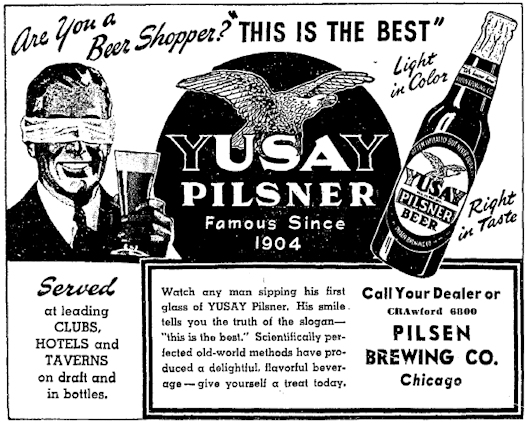
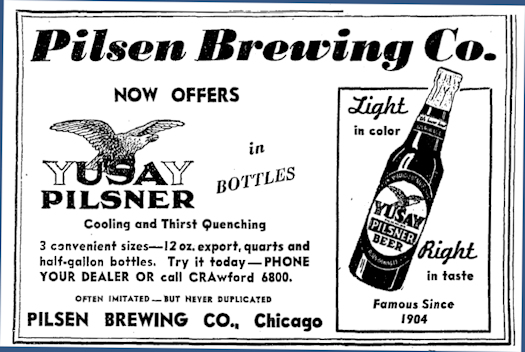

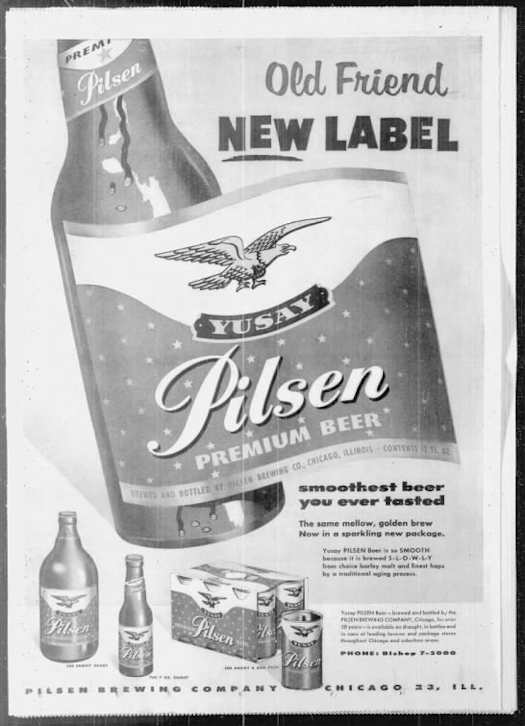
Ad Below - Placed in the 1933 World's Fair
World Fair Memorial of the Czechoslovak Group

